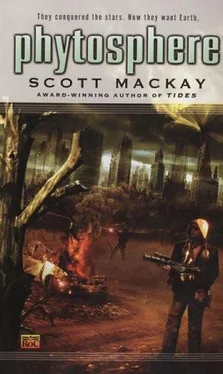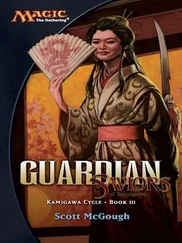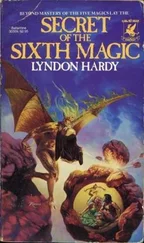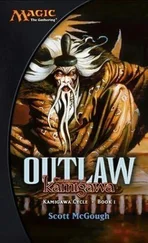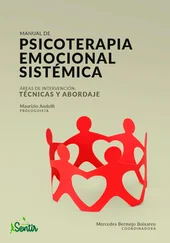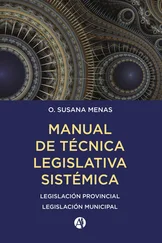At times Glenda thought she heard screams outside. Once or twice she grew convinced she heard cries
for help, as if the Tarsalans expected her to rescue them. Fat chance.
At last, the fire burned a safe distance from the cave.
Glenda, Fernandes, and the children went out to have a look.
The world was ashy, and embers flew everywhere. The main body of the fire burned about a mile off, the flames sometimes leaping a hundred yards into the air.
“Cool,” said Jake.
She glanced at her son. He was dirty from head to foot. He had Leigh’s pistol stuffed in his pants and his Montclair slung over his shoulder, and even though he was only twelve, he now possessed a disconcerting maturity and a battle-hardened stare as sturdy as cement. Yet…yet he was still a kid…because this fire was cool .
Light. It flowed into her eyes with a calming influence. All of the dry underbrush and tree branches had gone up, but there were still a number of tall tree trunks, horribly charred by the fire, sticking out of the ground like black fenceposts, all of them now backlighted by the frenzied inferno a mile off. She looked for figures moving through this outpost of Hell, flipping down her night-vision goggles but, because of the heat, all she saw was a blinding wash of green.
So she went back into the cave, got the binoculars, and scanned the destroyed forest for miles around.
She didn’t see a soul—Tarsalan or human.
They all watched the fire burn for the next hour. No human first responders came to put it out, and no fire planes flew by to douse it with payloads of retardant. Chattahoochee, protected under law, just burned and burned.
She wondered how many Tarsalans had died.
After an hour, everyone got bored with watching the fire.
Fernandes went to poke around in the ashes, getting as close as he could to the main body of the fire.
The girls went inside to sleep while Glenda and Jake stayed on the ledge to keep watch.
Four hours later, Morgan and Melissa came outside to stand guard. Glenda and Jake went inside. By this time, Fernandes had come back and was dozing in the corner.
Glenda fell asleep in minutes.
A couple of hours later she was awakened by a strange noise outside. She opened her eyes. She listened more closely. It sounded like hail. It thumped down all over the forest, and hissed in the embers.
“Aunt Glenda?” Melissa called from the cave entrance.
Glenda got up and went outside.
Thumb-sized chunks of hail fell from the sky, only this wasn’t ordinary hail—this was green hail. It took her a moment to realize what was going on. Then she looked up at the sky. Jake and Fernandes came to the cave entrance. Excitement exploded through her body, but she suppressed it. Had Gerry done it?
Had his crazy scheme to push the Moon closer to Earth with a big asteroid actually worked?
She walked out to the ledge and picked up a chunk of hail. By this time Hanna had appeared at the cave entrance as well. The hail melted in her hand, leaving behind a green residue, like cream of spinach soup.
Everybody started picking up their own chunks of hail. The sky was black as oil. But surely to God this had to mean something. How long would it take, she wondered? Would it all fall to Earth, or would some of it drift into space? And if it fell into their oceans, how would it affect things? Was it dead? Or was it still alive?
Over the next several hours the green hail fell with increasing rapidity, so fast that, despite the high temperature, there was some moderate accumulation.
When the sky finally brightened—as at last it did—the forest floor looked glazed in green Jell-O.
Morgan jumped up and down, clapping her hands together. “The stupid thing is gone, the stupid thing is gone,” and she put the words to the tune of “The Farmer in the Dell,” and soon Melissa and Hanna joined in, and even Jake at last got going on it, until they were all singing, “The stupid thing is gone, the stupid thing is gone, hi-ho the derry-o…” On and on, the way kids sang sometimes, just to hear their own voices. Fernandes, meanwhile, simply surveyed the surrounding devastation, as if he expected Tarsalans to emerge from the ashes at any second.
To Glenda, it was more than just the phytosphere falling to pieces. It was Gerry at last succeeding. After so many small and humiliating defeats throughout his life, he had achieved this biggest thing of all.
The hail continued for several hours, but finally tapered off around six o’clock. Clouds moved in under the thin green veil of the disintegrating phytosphere, but they were strange clouds because they were tinged with green.
After a while it started raining green rain. It pounded on the Chattahoochee Forest, and a green flood roared down the path and rushed past the cave. They had to rearrange sandbags to divert the flow from the cave. The sky darkened, and night—just a normal night, not a phytosphere night—came at last.
She tried calling Gerry on her fone, reasoning that if the phytosphere was falling she might get through.
But there was no service, not even a message, as if all the people who operated AT&T Interlunar had indeed gone home to be with their families in this time of crisis.
She pulled out Neil’s special phone, the one he used to communicate with various government officials, and tried to get through to an operator, any operator. This time she got something, but frustratingly, it was just a message telling her that service had been temporarily suspended during the current national emergency, and that only preauthorized numbers would be connected.
She looked for numbers in Neil’s backpack because, yes, Gerry might have saved the world, but she was still stuck out here, amid the burned-down forest and possible Tarsalan hostiles. She had no car, and her ammunition was running low.
As much as she looked for preauthorized numbers in Neil’s pack, she couldn’t find any.
Dawn came, and it was an Earth dawn. The sky was blue, the sun yellow, and only stray wisps of phytosphere remained, like emerald floss way up high. The Chattahoochee was a wasteland of ash coated in green slime. In and amongst the black-sparred tree trunks, she saw nine burned-out Tarsalan
Landing Vehicles, looking like tin cans that had been left in a bonfire all night. She saw no survivors.
She and Fernandes conferred for a while about what they should do and, when they were done, Glenda told the kids, “We’ll stay here for a while and see if anybody rescues us. I’m going to keep trying the Moon. And I’ll try Neil’s phone as well. In the meantime, Fernandes thinks we should dig through the house to see if we can salvage anything.”
After a breakfast of baked beans, Glenda, Fernandes, and the Thorndike kids marched down to the house. They had nothing but their hands to clear the rubble away with. The sun was bright, and it stung Glenda’s eyes after so long in the dark, but she took great joy in it. The uneasiness of having something drastically wrong with the world eased from her soul, and the quality and quantity of the sunshine increased her hope tremendously. Hanna, still not in the best health, sat out much of the time, taking guard duty while the others did the heavy work.
They spent the rest of the day digging into the basement supply room, where they found many crated provisions intact, enough to last six months if they rationed stringently. This was a great relief to Glenda, as it bought her a measure of time she hadn’t been counting on. They lugged the supplies up to the cave and packed them into the second chamber.
Now that all immediate danger had passed, her nieces again grew weepy at the loss of their parents and sister, and Glenda spent much of the afternoon comforting them.
Читать дальше
